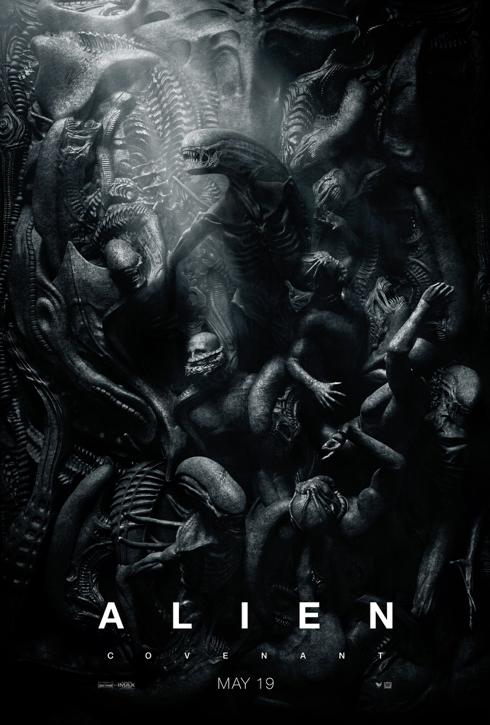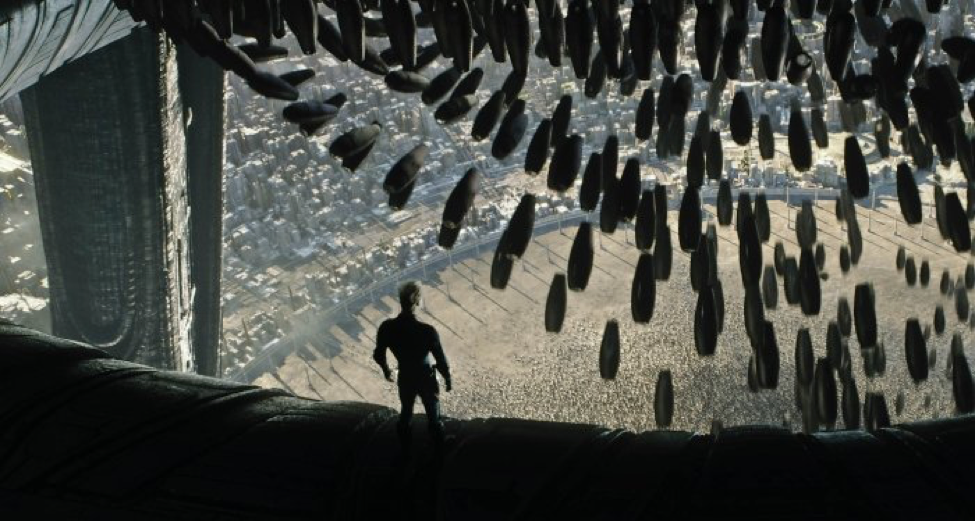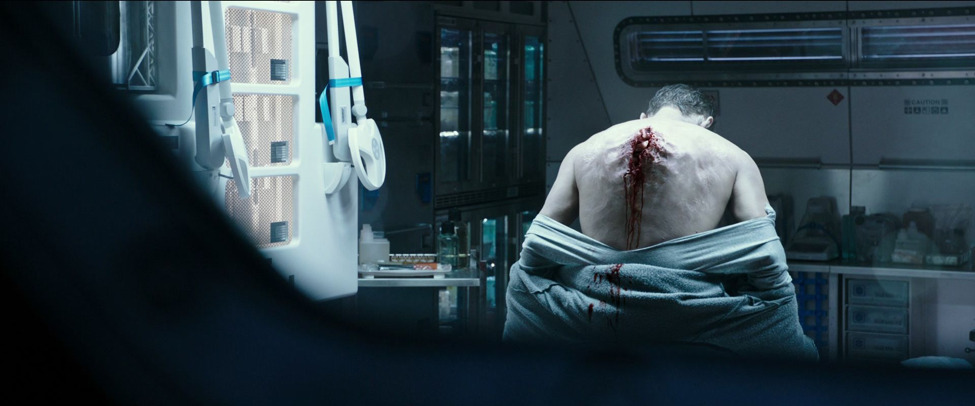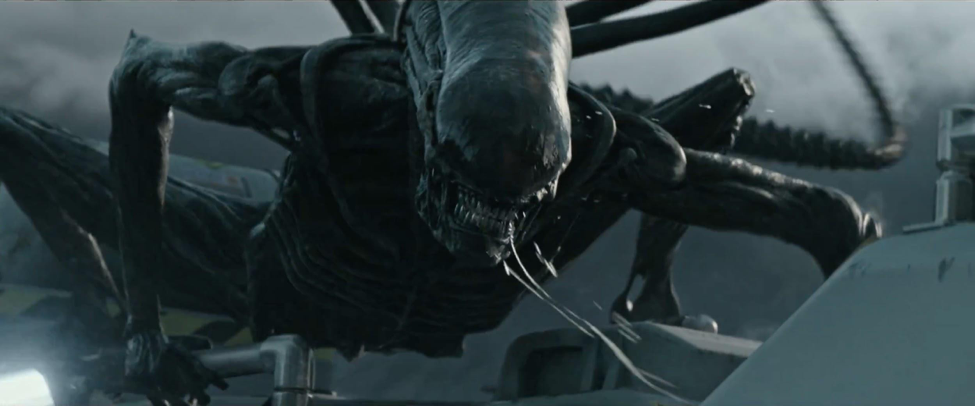ALIEN: COVENANT Review

Director: Ridley Scott
Genre: Horror, Sci-Fi
Year: 2017
Between 1960 and 2017, cinema experienced a cataclysmic shift in horror aesthetics, dating back to the French New Wave’s toe-dipping with Georges Franju’s EYES WITHOUT A FACE. A growing focus on the abject and the organic led to a heightened viscera that studios had been prone to avoid for much of cinema’s lifetime. From the cannibalism of Tobe Hooper’s TEXAS CHAINSAW MASSACRE to the macabre perversions of John Carpenter’s THE THING, horror had finally begun to embrace the shock value that would later go on to define the careers of Cronenberg, Roth, and anyone of their ilk. But if I were to give credit to one person for the most otherworldly contribution to the moving image of horror, it would be H.R. Giger, a man whose sadomasochistic predilections formed the basis for modern horror’s most memorable creation: the xenomorph.
From ALIEN’s release in 1979 to 2017, horror has never been the same. No slasher villain has been more inventive in design or more enigmatic. As much as Giger explained the life cycle of his perfect organism (from egg-laying facehugger to shadowy, towering rapist), it remained rather unclear how this monster came into existence, a question of creationism that was further posited in Ridley Scott’s return to the helm with 2012’s PROMETHEUS. Before 2017, the xenomorph made seven cinematic appearances (including two somewhat non-canonical entries in the ALIEN VERSUS PREDATOR franchise). Of those seven, ALIEN director Ridley Scott had directed two: the unforgettable original and the polarizing sidestep, PROMETHEUS, a film that served to open up Scott’s universe to more exploration.

Drop it like it’s hot
Word got around rather quickly, and still seems to ripple into the release of 2017’s ALIEN: COVENANT that Scott should let sleeping dogs lie: after all, the first two Alien films are two of cinema’s greatest horror vehicles. But why? Scott has yet to really explore his universe to its full potential. As a philosopher and a stylist, he remains one of blockbuster’s last successful auteurs, right up there with Michael Mann. Telling a director to let his franchise die despite having only directed two out of seven entries is not only unjust, but wildly offensive. The shoes Scott needed to fill with ALIEN: COVENANT were his own, a pair of late-’70s slippers he had handed off to James Cameron, David Fincher, Jean-Pierre Jeunet, Paul W.S Anderson, and the Strause brothers. It’s a good thing they fit like a glove.
From its prologue to its grandiose opening sequence, Scott superseded my expectations like few directors out there. After his unbelievably dull Oscar-bait, THE MARTIAN, his return to deep space is an intoxicating smoothie of the two things he knows best: scientific accuracy and philosophical lamentation. An elegant set of verbal aerobics between Guy Pearce and Michael Fassbender sets the thematic backdrop for ALIEN: COVENANT’s narrative. We cogitate on our mortality, begging the question as to why the human race is so desperate to find God if all we seem to do is play God. After the slow burn of the prologue and the film’s cross-fading title passes, Scott pulls a fast one on his audience, waking up the crew of the USCS Covenant after a solar flare causes a ship malfunction, killing their captain. This wrench in the gear causes the Covenant to change course, descending on a nearby habitable planet after they receive a humanlike transmission singing John Denver’s “Take Me Home, Country Roads.” Following the PROMETHEUS playbook, the Covenant crew doesn’t care to scan the planet—my one gripe with the film’s first act, albeit a minor one.

MFW my crewmate recognizes a 150 year old folk song by some dude called John Denver
It’s a brilliant way of using a deus ex machina for an inciting incident. For a film about creation, the interests of the universe are firmly set against our heroes from ground zero. The death of the captain also elegantly prepares Katherine Waterston as our central protagonist. If you paid any attention to Scott’s grandiose social media presence, you’d know that the Covenant crew are entirely staffed by couples, all aboard a one-way colony mission to prepare mankind for the Earth’s imminent extinction. As such, Waterston is the only member of the Covenant that is on her own before we are introduced to any biological threat, immediately cementing her as the film’s new Ripley: ready to kick ass because she has nothing left to lose. And yet, Scott realizes that he needs to try harder than just giving his audience more of the same. What begins as slasher fare slowly but surely finds its footing in a far more intricate meditation on passing the baton for who plays God.
Scott rips his first act right out of Cameron’s ALIENS playbook. The banter and professionalism of the Covenant isn’t quite as hierarchal as the colonial marines, but also not as hapless as the original’s Nostromo. After an incredibly long burn akin to the original director’s cut, we finally make our way onto the uncharted planet. The level of restraint here is unheard of for a 2010s blockbuster. Not only does it take a good hour for the film’s action to take shape, but ALIEN: COVENANT’s most invigorating moments occur in the eerie rhetoric that fuels much of Scott’s discourse on identity. Compared to its science fiction counterparts, Scott’s film has more in common with ARRIVAL or EX MACHINA than it does with STAR TREK: BEYOND, and it’s all the better for it. Scott knows what his fans want: they are looking for a certain degree of viscera, and will refuse to leave the theatre without seeing at least one facehugger, but he’s also bored of showing the same visual cues for the umpteenth time.
Consequently, Scott treats ALIEN: COVENANT as an exercise in tentpole revisionism, and it’s all accomplished through a simple change in perspective. ALIEN: COVENANT is not a film about mankind’s usurpation by the unknown. It’s about being the architect of their own demise. What once was the highest point of terror is now a vision of glory. What should be a moment of peace turns into a realization of madness. The spectacular visual effects only serve to amplify this, cementing Scott as a reigning champion of digital and practical integration. Having said that, I do think it’s disappointing that the xenomorph itself isn’t entirely practical. It still does not look nearly as terrifying as in the 1979 original or Cameron’s sequel.
But that doesn’t really matter, because the xenomorph is secondary to Scott’s interests here, giving priority to threats that ultimately feel refreshing to a franchise that has exhausted its titular nemesis. Enough time has passed for Scott to realize that the Covenant crew would need to face a foe of equal measure to the original xenomorph. Cameron upped the ante by giving us a queen Alien and countless cronies, but Scott knew the film needed something new. Since the xenomorph had always been referred to as a perfect organism, it only made sense that its competitor would be a synthetic. Many (myself included) would argue that ALIEN’s finest moment involves an android’s malfunction, resulting in a bonkers brawl that nearly ends with Sigourney Weaver having a rolled-up newspaper shoved down her throat. ALIEN: COVENANT embraces that horror over the cyclical terror of its eponymous predator.

Oh sick back tattoo, dude
That’s where Michael Fassbender comes in. In a performance of emotional gravitas not seen since Ripley’s affection for Newt in ALIENS, Fassbender commands the screen with grace, wit, confidence, and ego, ingeniously rounding out the philosophical discourse that Scott had posited with PROMETHEUS. A scene far too good to spoil mediates a discourse on egocentrism and power with nothing but a flute, urging the viewer to consider what may happen when our creations learn to create. All of ALIEN: COVENANT’s co-stars, although fantastic in their emotional delivery and their commitments to one another, are beholden to Fassbender’s elliptical transition. Danny McBride, Katherine Waterston, and Billy Crudup take center stage as the Covenant’s lead crew, and thanks to each character’s opposing interests, their human flaws ingeniously contrast with Fassbender’s logical, albeit cruel, impartiality.
What’s fascinating is that ALIEN: COVENANT is wholly insular as a modern day blockbuster; a film not beholden to the standards of common day tentpoles. It prioritizes its thematics over any need for immediate spectacle, a quality that I’m finding in all my favorite recent blockbusters, from GHOST IN THE SHELL to A CURE FOR WELLNESS. And yet, ALIEN: COVENANT demands to be viewed in unison with its prequel so as to cohesively articulate its thesis. Fassbender’s fascination for LAWRENCE OF ARABIA, something regularly hinted at in PROMETHEUS and reiterated in a sequence where he sings himself a melody from David Lean’s masterpiece, expertly denotes the identity crisis his android is facing. He is both servant to his empire and master of his universe, only free so long as none of his peers are nearby to command him, much like T.E Lawrence himself. Fassbender’s uncanny resemblance to Peter O’Toole only amplifies this core thematic. Naturally, the mileage one will get out of Scott’s themes will likely depend on how PROMETHEUS registered with viewers, but if you’re willing to indulge in the discourse first and foremost, then ALIEN: COVENANT will bear the sweetest fruits of any AAA feature.

OnePerfectShot: THE DARK KNIGHT
For years PROMETHEUS was shamed as a work of art wholly unnecessary to the Alien canon. Its title wasn’t aligned with the series and the xenomorph had little-to-no screen time. ALIEN: COVENANT seems to bridge this divide in more ways than one. Much like its forebear, it could have just as easily been named COVENANT, but giving priority to ALIEN reinforces a notion of symbiosis. The Alien franchise and PROMETHEUS had been separated for far too long, and they finally no longer feel mutually exclusive. Scott has taken every facet of the Alien films that came after his 1979 original, from machine guns to more ambiguous androids, and has flipped it on its head. As an action-packed horror outing, ALIEN: COVENANT is the best we’ve had since ALIENS. But thanks to its cohesive weaving of its universe within a creationist philosophy, it may be the most rewarding entry in the entire series. That isn’t to say that science fiction hasn’t been making moves towards more introspective thematics, but it’s a welcome surprise to see such a massive blockbuster chart territory commonly reserved for the likes of Alex Garland or Denis Villeneuve. What used to be great action with feminist undertones is now a far more disturbing study of divinity. Where PROMETHEUS sought to find God, ALIEN: COVENANT has revealed that we are all someone’s God, allowing Ridley Scott to give purpose to his polarizing 2012 feature, completing the series’s world building, and answering the final question of what came first: the xenomorph or the egg?
Verdict: Recommend




1 Response
[…] Read the full review here. […]